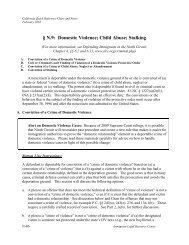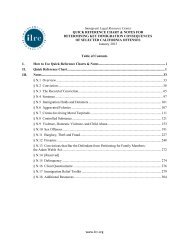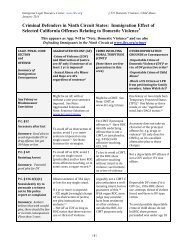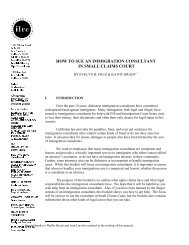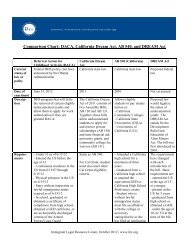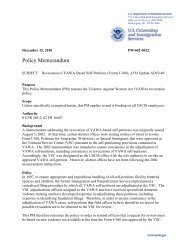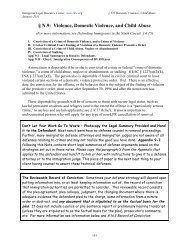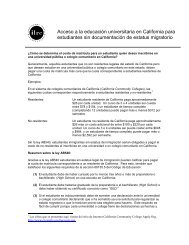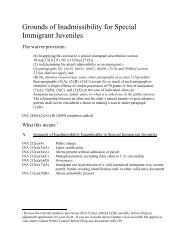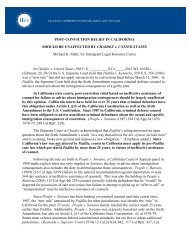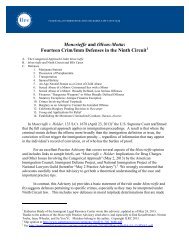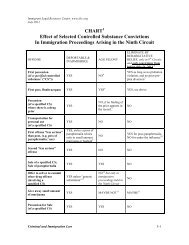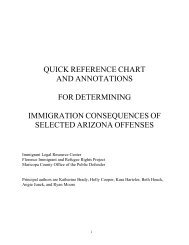quick reference chart and notes for determining immigration - ILRC
quick reference chart and notes for determining immigration - ILRC
quick reference chart and notes for determining immigration - ILRC
You also want an ePaper? Increase the reach of your titles
YUMPU automatically turns print PDFs into web optimized ePapers that Google loves.
Cali<strong>for</strong>nia Quick Reference Chart <strong>and</strong> Notes<br />
February 2010<br />
One-year sentence must be imposed. Theft is not an aggravated felony if a sentence of<br />
364 days or less is imposed. 8 USC § 1101(a)(43)(G). Even a misdemeanor theft with a oneyear<br />
sentence imposed will be an aggravated felony. See § N.3.<br />
A sentence imposed pursuant to a recidivist enhancement, <strong>for</strong> example <strong>for</strong> petty<br />
theft with a prior, will be counted toward the sentence of a year or more required <strong>for</strong> a<br />
theft to be an aggravated felony. The Supreme Court recently overturned Ninth Circuit<br />
precedent to hold that a sentencing enhancement imposed as a result of a recidivist offense shall<br />
count towards the length of sentence imposed. U.S. v. Rodriguez, 128 S. Ct. 1783 (2008),<br />
overturning in part U.S. v. Corona-Sanchez, 291 F.3d 1201 (9 th Cir. 2002)(en banc). In Corona-<br />
Sanchez the Ninth Circuit had held that a conviction <strong>for</strong> petty theft with a prior under P.C. §§<br />
484, 666 is not an aggravated felony, regardless of sentence imposed, because it would not<br />
consider sentence imposed pursuant to a recidivist enhancement. The Supreme Court<br />
disapproved this approach in Rodriquez.<br />
Theft by fraud. A conviction of theft by fraud under PC § 484 where the loss to the<br />
victim was $10,000 or more might be charged as an aggravated felony even if a sentence of a<br />
year or more was not imposed. See Part C, Fraud.<br />
Receipt of Stolen Property. A conviction <strong>for</strong> receipt of stolen property under P.C. §<br />
496(a) categorically qualifies as a receipt of stolen property aggravated felony conviction, if a<br />
sentence of a year or more is imposed. 191 (As discussed below, this offense is divisible <strong>for</strong><br />
moral turpitude purposes.)<br />
2. Theft <strong>and</strong> Receipt of Stolen Property as crimes involving moral turpitude<br />
Theft with intent to permanently deprive the owner is a crime involving moral turpitude<br />
(“CMT”), while temporary intent such as joyriding is not. 192 See discussion of the <strong>immigration</strong><br />
impact of conviction of one or more crimes involving moral turpitude at § N.6, <strong>and</strong> at Chapter 4,<br />
Defending Immigrants in the Ninth Circuit.<br />
Cali<strong>for</strong>nia theft. Counsel should assume that any conviction under P.C. § 484 is a moral<br />
turpitude offense, because courts are likely to hold that it includes offenses that involve neither<br />
intent to temporarily deprive nor fraud. The fact that the offense involves theft of services is<br />
not relevant to moral turpitude, only to the aggravated felony “theft” definition.<br />
Cali<strong>for</strong>nia receipt of stolen property under P.C. § 496(a), however, is divisible <strong>for</strong><br />
moral turpitude purposes because it includes intent to temporarily deprive the owner of the<br />
property. 193 If counsel pleads specifically to temporary intent, a § 496(a) offense should not be<br />
191 Matter of Cardiel-Guerrero, 25 I&N Dec. 12 (BIA 2009), Verduga-Gonzalez v.Holder, 581 F.3d 1059 (9 th Cir.<br />
2009).<br />
192 See, e.g., discussion of cases in Castillo-Cruz v. Holder, 581 F.3d 1154 (9 th Cir. 2009).<br />
193 Ibid.<br />
Immigrant Legal Resource Center N-115



